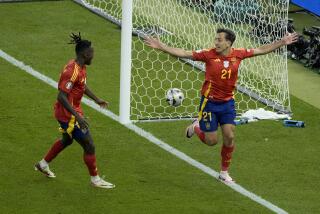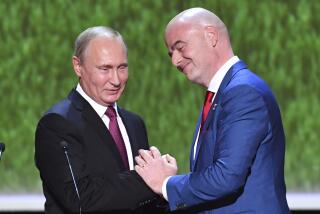Portugal Hopes for a Smooth Euro 2004
- Share via
High up and unseen in the blue Portuguese summer sky, AWACS surveillance aircraft on loan from NATO will protect England’s David Beckham.
Much lower, but similarly hidden, police snipers on Lisbon rooftops will provide cover for France’s Zinedine Zidane.
Along Portugal’s Algarve and Atlantic coasts, warships will patrol to make sure that no harm comes to Spain’s Raul.
And on the Portuguese-Spanish border, guards will stop and search vehicles, giving Italy’s Francesco Totti a better chance to survive the next three weeks unscathed.
Security, it appears, is as much a concern at Euro 2004 as soccer.
The European Championship, a quadrennial tournament that ranks behind only the Olympic Games and the World Cup in international sporting significance, begins Saturday.
For the next three weeks, the focus of the soccer world will be on the nine Portuguese cities where the 16-nation, 31-game tournament is being played. The hope is that it will be only the matches that make the headlines.
The threat of a terrorist attack -- much more real and closer to home since train bombings killed 191 in Madrid in March -- has cast a pall on what was, as recently as 1996, one of the sport’s showpiece events. Still, the fans will come, more than a million of them, and tens of thousands will be foreign. If suitably impressed, many will return as tourists, bringing much-needed revenue to the Portuguese economy.
Portugal has spent $4.8 billion on the tournament, upgrading road and rail links and medical and other facilities. A total of $869 million has gone into building seven stadiums and renovating three others.
“It’s been a big investment for a small country,” Jose Luis Arnaut, the country’s minister in charge of sport, told Associated Press, “one of the greatest financial outlays ever in Portugal.”
The money, he said, is well spent. “Euro 2004 goes beyond soccer. It’s an event that gives us the chance to show that Portugal is a modern country.”
The hope is that fretting about costs and fears about hooliganism and terrorism will fade, once the matches begin and attention focuses on the players.
Italy’s Coach Giovanni Trapattoni maintains that a single player can make all the difference.
“Each team has one player it really counts on, and Totti is that player for us,” Trapattoni said. “There is not a Totti on any other team. Just like France depends on Zidane’s legs, we depend on Totti.”
Four years ago, Belgium and the Netherlands jointly staged Euro 2000, which France won in dramatic fashion, defeating Italy, 2-1, in overtime in the final at Rotterdam.
Italy had been leading, 1-0, with half a minute or so remaining when it all fell apart.
Understandably, the Italians, who won as the host nation in 1968, are desperate to avenge that loss.
But the European Championship is a difficult tournament to win.
The quality of the field is deep, and although France is the defending champion and favorite, the title could just as easily go to Germany, Spain, the Czech Republic, the Netherlands, England or even to host Portugal when the final is played in Lisbon on July 4.
And if Trapattoni is correct, the seven serious contenders that stand in Italy’s way all have a standout player who could take the trophy elsewhere.
In France’s case, it is Zidane, no matter that he endured a poor season at Real Madrid and no matter how much success his French teammate, Thierry Henry, enjoyed at Arsenal.
France’s Coach Jacques Santini is counting heavily on Zidane.
“In a tournament of such intensity, where you need to be strong technically, tactically and physically, you need all your big weapons,” he said. “Not a single team can win Euro 2004 without its leaders.”
Germany has self-styled leaders aplenty, not least of them outspoken goalkeeper Oliver Kahn.
Germany lost the 2002 World Cup final to Brazil, and since then Coach Rudi Voeller’s erratic team has been shocked several times, most notably by Romania in a 5-1 loss in April and most recently by Hungary, which beat Germany, 2-0, on Sunday.
Kahn might believe he is indispensable, but midfielder Michael Ballack is the player Voeller would miss most if he were unavailable.
“Just him being on the pitch is important,” Voeller said. “He is not only a great football player but also a true leader. Michael can respond to pressure and has demonstrated many times that he is a match winner.”
Germany won Euro 1996 in England, beating the Czech Republic, 2-1, in overtime in the final. The Czechs -- then as part of Czechoslovakia -- won Euro 1976.
This time, in veteran midfielder Pavel Nedved, they have a player who can take them to the championship again. Despite all the honors he was won, Nedved is motivated.
“I would throw all the awards into a bag and exchange them for the European Championship title,” he told Reuters in Prague.
So, most likely, would Spain’s Raul, whose coach, Inaki Saez, says of him, “He is the reference point.”
The Netherlands’ point man is Manchester United goal scorer extraordinaire Ruud Van Nistelrooy.
“If we can just combine the right drive with our creative and technical abilities, if we can just bring that, we can be champions,” Van Nistelrooy said.
And then there is England, which has never won the tournament. Beckham could change that, but it is Liverpool’s Steven Gerrard whom Coach Sven-Goran Eriksson is counting on to set matters straight.
“He’s one of the important players we have,” Eriksson said, carefully choosing his words. “He’s a world-class player, and he can play different positions in midfield. We’ve lost very few times with Steve Gerrard on the pitch.”
Eriksson could say the same about himself.
Since the Swede took charge in 2001, England has lost only one meaningful match -- the 2002 World Cup quarterfinal to eventual champion Brazil on a fluke goal by Ronaldinho.
England is better known for its hooligans than for its silverware, however, which is why the British government has barred 2,500 of them from traveling to Portugal.
The Portuguese, led by veteran Luis Figo, also must count among the favorites, but there will be many in Portugal who will be happy simply to see the tournament go off without a hitch, even if it means the home team not winning it all.
*
(BEGIN TEXT OF INFOBOX)
A Look at Euro 2004
GROUPS
The four pool-play groups, with world ranking and qualifying group record and place in parentheses:
GROUP A
* Greece (35, 6-2-0, 1st in Group 6)
* Portugal (22, qualified as host)
* Russia (31, 4-2-2, 2nd in Group 10)
* Spain (3, 5-1-2, 2nd in Group 6)
GROUP B
* Croatia (20, 5-2-1, 2nd in Group 8)
* England (13, 6-0-2, 1st in Group 7)
* France (2, 8-0-0, 1st in Group 1)
* Switzerland (47, 4-1-3, 1st in Group 10)
GROUP C
* Bulgaria (40, 5-1-2, 1st in Group 8)
* Denmark (15, 4-1-3, 1st in Group 2)
* Italy (10, 5-1-2, 1st in Group 9)
* Sweden (18, 5-1-2, 1st in Group 4)
GROUP D
* Czech Republic (11, 7-0-1, 1st in Group 3)
* Germany (8, 5-0-3, 1st in Group 5)
* Latvia (53, 5-2-1, 2nd in Group 4)
* Netherlands (5, 6-1-1, 2nd in Group 3)
RUNNERS-UP PLAYOFFS
While all qualifying group winners automatically advanced to the finals, all runners-up had to play in two-game series, with the winner on aggregate also advancing. The playoff results:
* Latvia d. Turkey, 3-2
* Netherlands d. Scotland, 6-1
* Croatia d. Slovenia, 2-1
* Russia d. Wales, 1-0
* Spain d. Norway, 5-1
SITES
The stadiums and cities in which the games will be played:
* Municipal Stadium, Aveiro
* Municipal Stadium, Braga
* Cidade Stadium, Coimbra
* Algarve Stadium, Faro-Loule
* Henriques Stadium, Guimaraes
* Pessoa Stadium, Leiria
* Avalade Stadium, Lisbon
* Bessa Seculo XXI and Dragao stadiums, Porto
*
SCHEDULE
Saturday
Portugal vs. Greece, Porto
Spain vs. Russia, Faro-Loule
Sunday
Switzerland vs. Croatia, Leiria
France vs. England, Lisbon
Monday
Denmark vs. Italy, Guimaraes
Sweden vs. Bulgaria, Lisbon
Tuesday
Germany vs. Netherlands, Porto
Czech Republic vs. Latvia, Aveiro
Wednesday
Greece vs. Spain, Porto
Russia vs. Portugal, Lisbon
Thursday
England vs. Switzerland, Coimbra
Croatia vs. France, Leiria
June 18
Bulgaria vs. Denmark, Braga
Italy vs. Sweden, Porto
June 19
Latvia vs. Germany, Porto
Netherlands vs. Czech Repub., Aveiro
June 20
Spain vs. Portugal, Lisbon
Russia vs. Greece, Faro-Loule
June 21
Croatia vs. England, Lisbon
Switzerland vs. France, Coimbra
June 22
Italy vs. Bulgaria, Guimaraes
Denmark vs. Sweden, Porto
June 23
Netherlands vs. Latvia, Braga
Germany vs. Czech Republic, Lisbon
June 24
Quarterfinal, Winner Group A vs. runner-up Group B, Lisbon
June 25
Quarterfinal, Winner Group B vs. runner-up Group A, Lisbon
June 26
Quarterfinal, Winner Group C vs. runner-up Group D, Faro-Loule
June 27
Quarterfinal, Winner Group D vs. runner-up Group C, Porto
June 30
Semifinal, June 25 winner vs. June 27 winner, Lisbon
July 1
Semifinal, June 26 winner vs. June 28 winner, Porto
July 4
Final, Lisbon
*
PREVIOUS FINALS
* 2000 at Rotterdam: France d. Italy, 2-1, on a 103rd-minute golden goal.
* 1996 at London: Germany d. Czech Republic, 2-1, on a 94th-minute golden goal.
* 1992 at Gothenburg: Denmark d. Germany, 2-0.
* 1988 at Munich: Netherlands d. Soviet Union, 2-0.
* 1984 at Paris: France d. Spain, 2-0.
* 1980 at Rome: West Germany d. Belgium, 2-1.
* 1976 at Belgrade: Czechoslovakia d. West Germany, 2-2 (5-3 on penalty kicks).
* 1972 at Brussels: West Germany d. Soviet Union, 3-0.
* 1968 at Rome: Italy d. Yugoslavia, 2-0, in a replay after a 1-1 tie.
* 1964 at Madrid: Spain d. Soviet Union, 2-1.
* 1960 at Paris: Soviet Union d. Yugoslavia, 2-1, after extra time.
More to Read
Sign up for Essential California
The most important California stories and recommendations in your inbox every morning.
You may occasionally receive promotional content from the Los Angeles Times.










